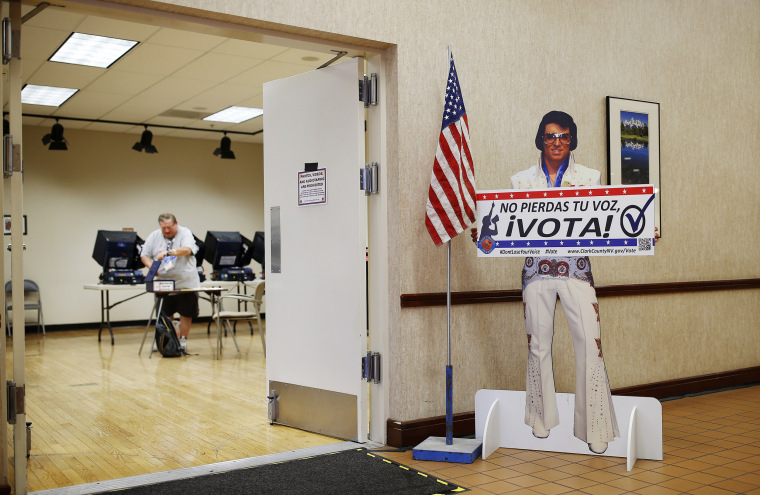For four elections since 2008, including two presidential ones, Mariela Hernandez has volunteered to ensure Spanish-language dominant Latinos participate in the Nevada caucus.
That’s come with some challenges.
“There’s not even a word for caucus in Spanish. You have to say kao-koos,” Hernandez said.
On Monday, Nevada’s state Democratic Party kicks off caucus training for Spanish speakers, starting earlier in the election cycle than other years.
“When we started last year, it was 12 weeks before the general election,” said Cynthia Jasso-Rotunno, DNC Latinx political director, referring to a program targeting Latinas, known as Mujeres Mobilize. “We’re starting now … so when one of the Democratic candidates becomes the nominee, they plop into a structure already there.”
The training includes how to vote early for the caucus, which Nevada will allow for the 2020 election cycle; it will start four days before the Feb. 22 caucus.
The early caucus days are an attempt to make up for the scrapped plans to allow for “virtual” caucusing that state party officials hoped would make it easier for people to participate in a state with many shift workers.
The DNC rejected a state plan to allow people to phone in their preferences for a nominee citing weak cybersecurity.
Still, Democratic Party Chairman Tom Perez planned to join in the effort to galvanize Spanish-speaking Latinos in the state and participate in the training and other events.
Nevada's Latino voters
There are over 865,000 Latinos in Nevada and about 415,000 are eligible to vote, according to Matt Barreto, principal of Latino Decisions polling firm. About 212,000 are registered to vote and 203,000 are eligible, over 18 and citizens, but not registered.
About a quarter of the state’s Latino population is Spanish speaking, about half are fully bilingual and about 20 percent speak only English, said Barreto.
In a recent Latino Decisions poll for Univision, a greater share of people who were interviewed in Spanish said they were almost certain they’d vote in the primaries. The number of people interviewed in Spanish was fewer than 100, however.
Nevada’s Latino population is centered mostly around Las Vegas and Reno. The Culinary Workers Union, which has a heavy immigrant membership, has played a large role in Latino political mobilization and get-out-the-vote efforts.
Organizing Latino political participation in the state has been something of a model in what is possible if there is investment in registering Hispanics to vote and turning them out — ever since Sen. Harry Reid, Nevada's longtime Democratic incumbent, survived a surprisingly close challenge from Republican Sharron Angle in 2010.
The party and some of its candidates have been slow to incorporate that lesson, with skepticism a result of the low showings of Latinos at the polls. But the surge in Latino voting in last year’s midterm elections has begun to change minds.
“From what I’ve seen on my end, I think there’s been an improvement. The DNC seems to be doing a lot more on the communications front,” said Jose Parra, a former adviser to Reid who now runs his own consulting firm, Próspero Latino.
Parra is seeing the national Democrats getting out their story in Spanish, providing media sound bites in Spanish and making spokespeople available to Spanish-language press, saying it's "refreshing to see compared to before.”
Latino voting gains
According to the state party, the total votes cast and turnout rates of Latinos grew 5 percent in 2018 over 2014.
In addition, there was a 120 percent increase in general election ballots cast in 2018, compared to 2014, in Nevada precincts that are heavily Latino. In non-Latino districts, the increase was 55 percent, said Shelby Wiltz, the Nevada Democrats' caucus director.
“Latino voters showed up in really wonderful numbers in 2018 and helped elect Democrats up and down the ballot,” Wiltz said.
In 2020, Nevada won’t have a statewide race at the top of the ticket as it did in 2018 when the governor's race was in contention and a Democrat won the seat for the first time since 1994.
That makes training more people to participate even more critical in building enthusiasm for voting in the general election.
“We know 2020 is going to be a huge year for us, and I think the caucus is the foundation for our success in the general election,” said Wiltz.
“Our electorate most resembles the national electorate. It matters what it says,” Wiltz said. “Here there is a high level of importance to ensuring we have high turnout, and the folks participating are really representative of our party in the state.”
Follow NBC Latino on Facebook, Twitter and Instagram

